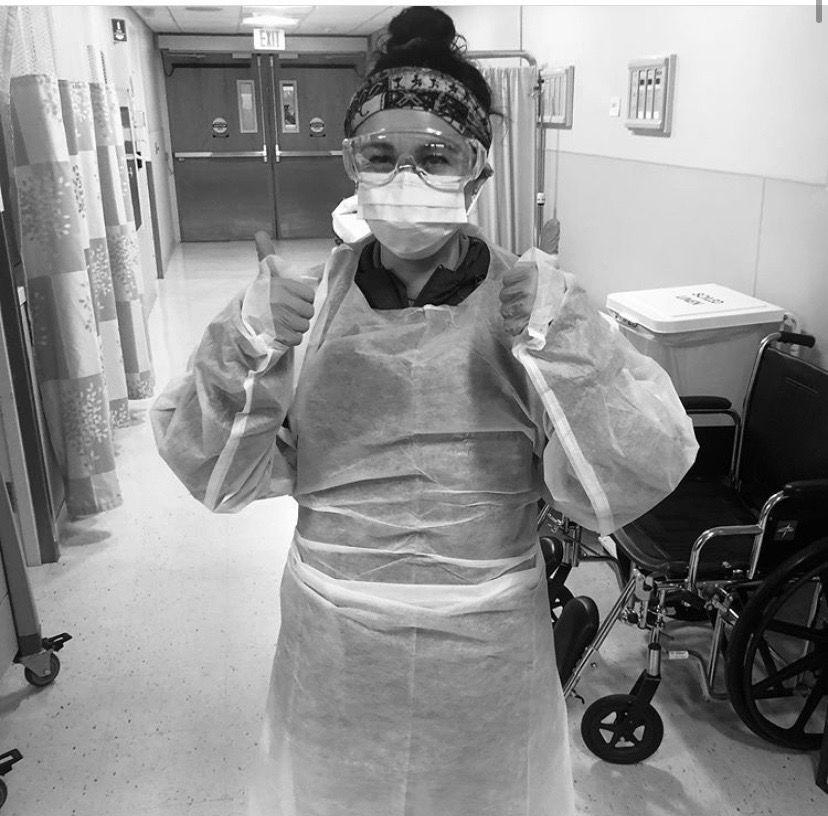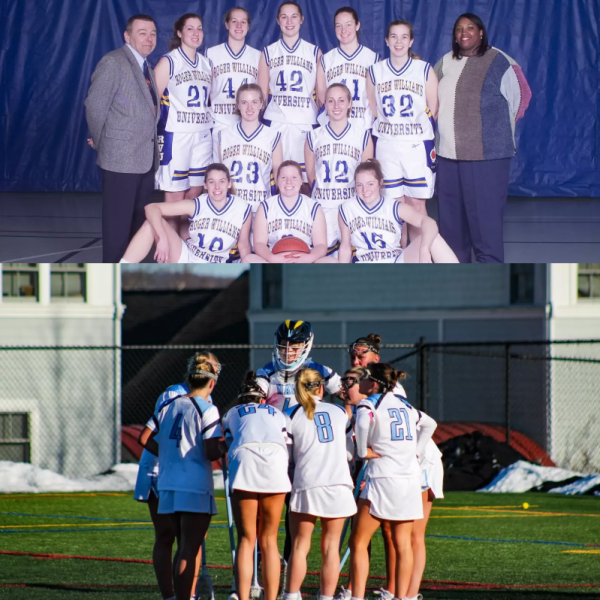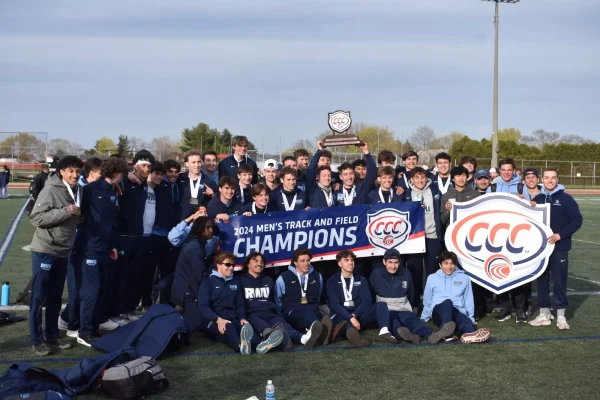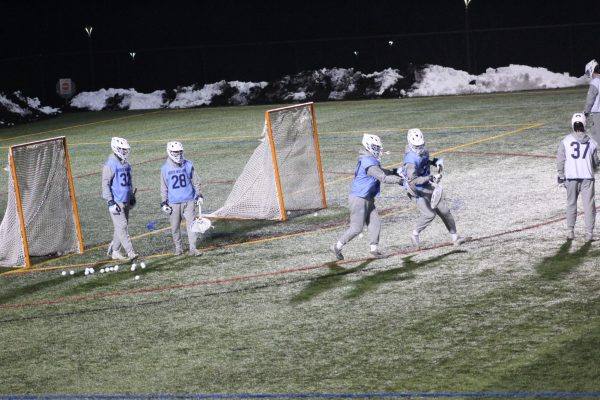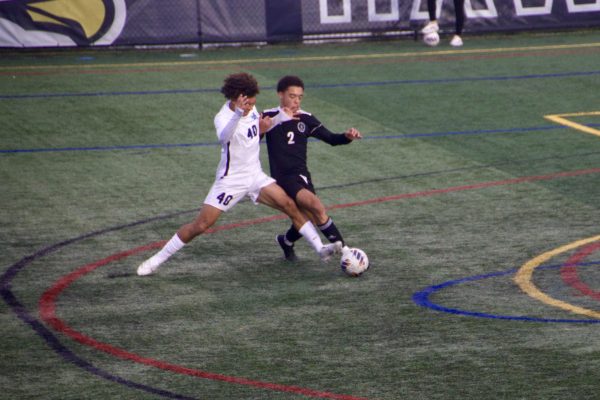“People in the medical field don’t run away when things get hard” Field hockey player and EMT Lea Peterson runs into battle against COVID-19
When she comes home, she leaves her shoes outside while only touching the door handle to her mud room. Her dad leaves a towel out for her so she can just throw her clothes in the washer as she heads straight to the shower. After she gets out, she wipes down all the surfaces she touched with bleach wipes, including her entire front seat and the steering wheel of her car.
This is Lea Peterson’s routine every time she comes home from a shift as an EMT during the COVID-19 pandemic.
From Upton, Massachusetts, Peterson is a rising senior and captain on the field hockey team. When she is not at RWU taking classes and playing field hockey, she works for the Beauport Ambulance Company in Gloucester, Massachusetts. She has been an EMT since May of last year.
She came home from spring break ready to work in order to make some money. Her shifts were relatively normal at that time. When the additional spring break was added, she decided to take a week off and then the statewide quarantine was put into place.
“I came back to work because I knew that it was the right thing to do,” Peterson said. “I saw medics that were over 60, 70 years old being called out of retirement to work. I knew my coworkers, who for the most part are older than me and have families, some with family members that are immunocompromised, were still going to be working.”
Peterson believes if this was five years from now and she was a physician’s assistant or in medical school, she wouldn’t be able to just sit back and watch.
“The medical field is my future, and part of signing up for this career path is understanding that most of the time, things were not going to be easy,” Peterson said. “Knowing that I was a fully capable 20-year-old EMT who wanted to dive further into the field of medicine, sitting at home when I know I could help, wasn’t an option for me.”
Peterson works 16-hour shifts and says the normal EMT shift can run from anywhere between 8 to 24 hours long.
“Each shift is different, since it is a call by call basis and we go wherever dispatch needs us to go, but lately it has been very different with the COVID-19 crisis,” Peterson said.
Peterson said most of the calls she has been responding to have been COVID-19 confirmed cases or COVID-19 rule out cases. This would mean they have to transport the patient from a facility to Beverly Hospital.
According to Peterson, Beverly Hospital is where most of the COVID-19 testing is being done right now. No matter what she is called for during her shift, she is always prepared.
“Whether it be a dialysis call, hospice call, 911 response or COVID call, I wear an N95 mask with a surgical mask over it and gloves and goggles,” Peterson said.
If Peterson is on a COVID-19 call or suspected to be, she has to wear extra PPE equipment.
“I wear a paper gown with double gloves, and the same mask and eyewear PPE,” Peterson said. “As of now, our saying has been that every patient has COVID until they are confirmed they don’t, meaning we wear N95 masks on every call… not only for our own safety, but for the patients.”
Since the virus shows up differently in almost everyone and some people can be asymptomatic, Peterson and her coworkers do not take any chances.
Comparing her shifts now to what they were prior to COVID-19, current shifts are very different for Peterson. She used to be able to come home, make something to eat and make her way to the shower. Now showering is the very first thing she does when she gets home.
In addition to her decontamination process at home, she goes through another vigorous one after every call she goes to.
“Regardless of the nature of the call, I wipe down the entire back of the ambulance, change the sheets on the stretcher, wipe that whole thing down too, every cabinet, bench, surface that the patient or myself might have come into contact with,” Peterson said. “I wipe down the blood pressure cuffs, pulse oximeter, my stethoscope and I do it over about twice. For a lot of the decontamination, it is more of a mental battle than anything.”
Not only has COVID-19 had a huge impact on Peterson’s job, it has also impacted her and her father’s life at home. Her dad is 50 years old and asthmatic.
“He has to keep his distance more than ever,” Peterson said. “This is really hard for him, but he understands that he needs to. His room is upstairs and mine is on the main floor, so most of my time is just spent in my bedroom in order to prevent any contact with anything he may touch in the house.”
On top of working these long shifts, Peterson is taking online classes.
“My professors have been really supportive of me during this, but for the most part I try to only work shifts that aren’t during my online class times,” Peterson said.
Some of her professors are actually making masks for her. She said one of her old professors Dr. Robert Jacobson and her current advisor and genetics professor Dr. Kerri Warren have actually been manufacturing masks with laser cutters and 3D printers and sending them her way.
During this tough time, she is finding ways to keep herself stress free. Peterson likes to use her Peloton, hang out with her cats, paint and do her field hockey workouts.
As somebody who is on the front lines seeing this pandemic on a daily basis, Peterson believes that best thing everyone can do to contribute during this time is to stay home.
“I know a lot of people have been dealing with a lot of anxiety and fear, and believe me, I understand. I experience it every single day, but it is important to remember that if we stay home, I truly believe that the spread will be able to be slowed,” Peterson said.
Peterson feels a lot of frustration when she sees people not abiding by the social distancing regulations.
“The more people go out and come into contact with others, even if you’re ‘hanging out from 6 feet away,’ the [more the] virus has the potential to spread and to reach really vulnerable populations, which then I will be taking into the hospital in the back of my ambulance, where I don’t have the option to stay six feet away. I have no option but to put myself and in turn my dad, at risk,” Peterson said.
Peterson hopes people take this time to do things they never have time to do.
“[I hope they] spend time with their families if they have the ability to because right now I can’t and neither can millions of people across the world,” Peterson said.

